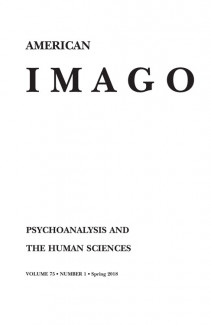
Johns Hopkins UniversityEst. 1876
America’s First Research University
American Imago Welcomes New Editors

A pair of Boston academics will take over the editorial duties of the journal American Imago this year. Murray M. Schwartz, Professor Emeritus in the Institute for Liberal Arts & Interdisciplinary Studies at Emerson College, and Dawn Skorczewski, Director of University Writing and Professor of English at Brandeis University, take the reins from Otterbein University's Louis Rose. The journal has a distinguished history dating back to Sigmund Freud, and the new editorial team joined us for a Q&A about their new challenge.
How do you two divide the labor as editors for American Imago?

How important is the journal's role in keeping the legacy of Freud and his colleagues alive?
American Imago was created by Sigmund Freud and Hanns Sachs in Boston in 1939, as the American counter-part of the European journal Imago. It has a long and distinguished history as a journal of “Psychoanalysis and the Human Sciences.” Now returning to Boston, American Imago will celebrate its 80th year in 2019. In concord with Freud’s vision of psychoanalytic education, the journal has published essays and reviews on literature and other arts (including painting, photography and film, music and sculpture) psychoanalytic history and theory, and topics of special contemporary interest, such as trauma studies and post-colonial studies, and the intersections of psychoanalysis and political experience. We intend to maintain the journal’s scope and quality, accepting essays from various theoretical perspectives if they are sufficiently accessible to a broad scholarly audience. We also intend to expand the journal’s scope to include greater attention to urgent contemporary concerns, such as the human response to environmental changes, the problems of human pseudo-speciation, and developing concepts of gender and sexuality.
How important is interdisciplinarity to the success of the journal?
Interdisciplinarity is central to the success of American Imago. Its purview is the full range of the human sciences and the uses of psychoanalytic concepts to further the understanding of personal and collective experience, with the exception of clinical material, which is better included in other psychoanalytic journals.
What kind of things do you have planned for both the near future and long term?
Our first issues, fall and winter 2018, will display continuity with American Imago’s distinguished history, publishing essays and reviews from international sources on psychoanalytic theory, post-colonial studies, traumatic experience, painting, literature and film. We are discussing special issues on “Ghosts and Ancestors,” Freud’s “Wolf Man,” Psychoanalysis and Film, and, perhaps, an issue devoted to book review essays on the intersections of historical and personal experience. We will continue to publish the annual Silberger Prize interdisciplinary essay selected by the Boston Psychoanalytic Society and Institute, and we will celebrate the return of American Imago to Boston on its 80th anniversary.


